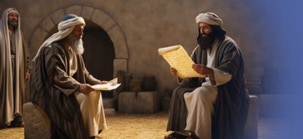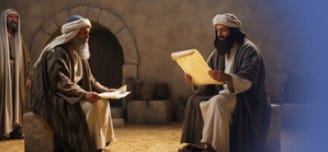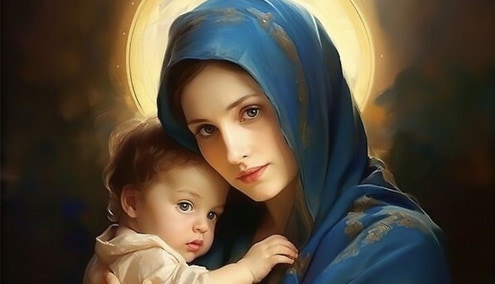


Common Objections
Common Objections
Catholic Outlook
Catholic Outlook

Catholic Outlook
Common Objections
Common Objections
__________ Recent Additions __________
Catholic Outlook
Catholic Outlook
__________ Mary and the Saints __________
“It is wrong to call Mary the ‘Mother of God.’ God is eternal, without beginning, so it is impossible for Him to have a mother.”
Gary Hoge

I know the phrase “Mother of God” gives Protestants the heebie-jeebies, but that’s because it sounds to them as if we’re saying Mary created God, or Mary is part of the Godhead, or that she is pre-existent, like God.
But the phrase “mother of God” doesn’t mean any of that, and the concept it expresses is something almost all Protestants agree with:
1. Mary is the mother of Jesus (cf. Matthew 2:11, John 2:5).
2. Jesus is God.
Therefore,
3. Mary is the mother of God.
She is the mother of he-who-is-God. That’s literally all it means. And being God’s mother doesn’t mean she created God. Your own mother didn’t create you, after all, God did.
You believe in the incarnation, don’t you? You believe that God took on human flesh and a human nature in Mary’s womb, don’t you? If so, then she carried God in her womb, she gave birth to God, and she is therefore God’s mother.
The phrase “mother of God” is nothing to balk at. In fact, Martin Luther, the founder of Protestantism, taught it:
God did not derive his divinity from Mary; but it does not follow that it is therefore wrong to say that God was born of Mary, that God is Mary’s Son, and that Mary is God’s mother... She is the true mother of God and bearer of God ... Mary suckled God, rocked God to sleep, prepared broth and soup for God, etc. For God and man are one person, one Christ, one Son, one Jesus, not two Christs ... just as your son is not two sons ... even though he has two natures, body and soul, the body from you, the soul from God alone.1
She is rightly called not only the mother of the man, but also the Mother of God... It is certain that Mary is the Mother of the real and true God.2
Catholics believe as Luther did. We certainly don’t claim that God had his beginning in Mary’s womb. Obviously, he had no beginning at all. It was he who created Mary, not the other way around.
But given the possibility of confusion, why insist on the title “mother of God”? What’s the big deal? Well, nowadays it probably isn’t a big deal, but in the fifth century it was.
Back then, Mary was called Theotokos (Θεοτόκος), Greek for “God-bearer,” or, more loosely, the “mother of God.” This was to emphasize that the baby in her womb was God in the flesh. In the Incarnation, the Second Person of the Trinity took on a human nature and became man in Mary’s womb.
But Nestorius, archbishop of Constantinople believed that Mary only carried a human person with a human nature, the man Jesus, in her womb, and so he said she should be called Christotokos (Χριστοτόκος), or “Christ-bearer,” or, again loosely, the “mother of Christ,” not the “mother of God.”
As you probably know, the orthodox Christian belief, shared by both Catholics and Protestants, is that Jesus was a single “person,” a divine person. We believe that at the Incarnation the second Person of the Trinity took on a human nature, in addition to His divine nature. He became the “God-man,” one person with two natures.
The Council of Ephesus, in 431, reaffirmed the orthodox doctrine that there was only one “person” in Mary’s womb, the second Person of the Trinity. Thus, because Mary carried God in her womb, they said it was proper to continue to refer to her as Theotokos, or “God-bearer.” The title “mother of God,” then, was not given to honor Mary, but to protect the orthodox doctrine of the Incarnation. As Martin Luther wrote,
The council [of Ephesus] has not offered anything new to faith but has strengthened the old against the new arrogance of Nestorius. This article of faith – that Mary is the Mother of God – is present in the Church from the very beginning and is not a creation of the council, but the presentation of the Gospel and the Scriptures.3
Modern Protestants agree with the idea that Jesus is God, and that Mary is His mother, but unlike Luther, they’re squeamish about putting two and two together and calling Mary, “mother of God.” Louisa Cozens, in her book, A Handbook of Heresies, wrote,
Even when they [Protestants] are willing to say that Jesus Christ is God, they shrink from the Catholic statement, that God was born of Mary; that God shed his blood for us on Calvary; that God died. Today as in the fifth century, in London as at Ephesus, the honour of Mary is the safeguard, the outpost of the adoration of her son. To acknowledge the Theotokos is to believe in God the Son made man.4
__________
1 Martin Luther, On the Councils and the Church, 1539.
2 Martin Luther, Luther’s Works, ed. Jaroslav Pelikan, (St. Louis: Concordia), 24:107.
3 Martin Luther, quoted in Robert Payesko, The Truth About Mary.
4 M.L. Cozens, A Handbook of Heresies, (London: Sheed and Ward, 1974), 45.
Copyright © 2024 Catholicoutlook.me
MENU